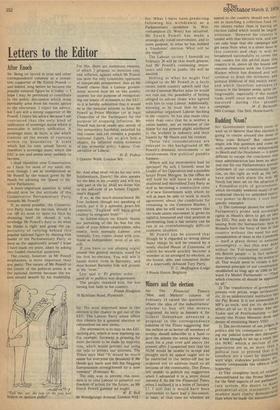After Enoch
Sir: Being on record in your and other correspondence columns as a consistent supporter of Mr Enoch Powell — and indeed, long before he became the popular national figure he is today — I hope I may be permitted to contribute to the public discussion which must inevitably arise from his recent advice to the electorate. I reject his advice, but I am still a strong supporter of Mr Powell. I reject his advice because I am convinced that the only kind of unification of sovereign states which is irrevocable is military unification. A sovereign state, de facto, is one which controls all the means of coercion within its boundaries. A state which has its own armed forces is therefore a sovereign state, which the EEC is not and seems most unlikely to become.
I shall therefore vote Conservative, as I have for most of my adult life, even though I am as unimpressed as Mr Powell by the reason given by Mr Heath for advising the Queen to dissolve Parliament.
A more important question is: what should now be the attitude of the Conservative Parliamentary Party towards Mr Powell?
If, as seems possible, the Conservative Party loses the election, should it cut off its nose to spite its face by shunning him? Or should it acknowledge Mr Powell's duty to do what he thinks is right and grasp the opportunity of rallying behind this popular national figure by electing him leader of the Parliamentary Party as soon as the opportunity arises? I hope I have made my point, albeit by asking two loaded rhetorical questions.
The county, however, as Mr Powell emphasises, is more Important than any party. The return of Mr Powell to the centre of the political arena is in the national interest because the nation should benefit by his leadership. For this, there are numerous reasons, of which I propose to mention only one: inflation, against which Mr Powell has been the only consistent opponent of comparable prominence. Just as Mr Powell claims that a Labour government would now be in the public interest for the purpose of renegotiating our treaty of accession to the EEC, so it is hereby submitted that it would be in the national interest to have Mr Powell as Prime Minister (or at least Chancellor of the Exchequer) for the purpose of stopping inflation. Mr Powell has never made any secret of the temporary hardship entailed by this course and yet remains a popular national figure. Let us give him a chance, for inflation makes nonsense of any economic policy, Labour, Conservative or Liberal.
D. E. Folkes
5 Queens Walk, London W5
































 Previous page
Previous page